六年级英语重点句型
- 格式:doc
- 大小:25.50 KB
- 文档页数:2

1.打招呼/问候●Hello/Hi ! 你好Hello/Hi ! 你好●Good morning/Morning ! 早上好Good morning/Morning ! 早上好●Good afternoon ! 下午好Good afternoon ! 下午好●Good evening ! 晚上好Good evening ! 晚上好●How do you do ? 你好How do you do ? 你好●How are you ? 你好(I’m) Fine / V ery well /OK, thankyou.好/ 很好/ 好,谢谢●Glad to meet /see you .见到你很高兴Glad to meet /see you, too.见到你也很高兴●Nice to meet /see you .见到你很高兴(It’s good to meet /see you .)见到你很高兴Nice to meet /see you, too.见到你也很高兴2.介绍●自我介绍I’m T om / My name isT om.我是汤姆/ 我叫汤姆●介绍他人This is Mr /Mrs MissLi .这是李先生/李太太/李小姐。
3.道别●Goodbye! 再见Goodbye!\ 再见●Bye-bye / Bye ! 再见Bye-bye / Bye ! 再见●See you then / again /tomorrow.回见/下次见/明天见See you. 再见4.认人●Who’s he / she ? 他/她是谁?He’s T om / She’s Mary .他是汤姆/她是玛丽。
●Who’s that ? 那是谁?That’s / It’s / She’s Mary.那是/她是玛丽●Are you Mary /cousin?你是玛丽吗?你们是表兄弟吗?Y es, I am . (No, I am not.)是,我是。
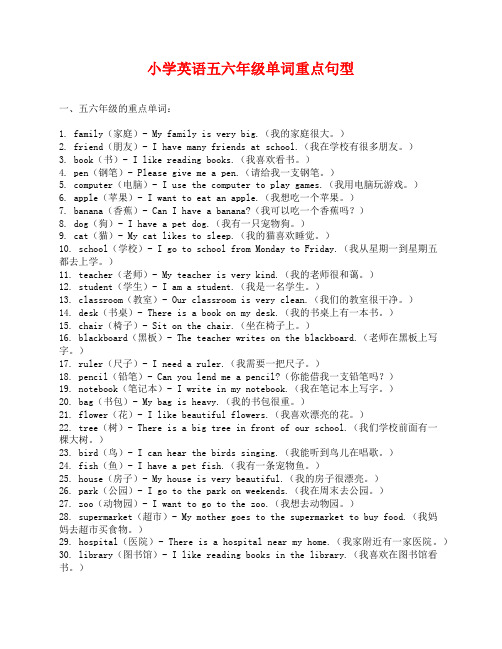
小学英语五六年级单词重点句型一、五六年级的重点单词:1. family(家庭)- My family is very big.(我的家庭很大。
)2. friend(朋友)- I have many friends at school.(我在学校有很多朋友。
)3. book(书)- I like reading books.(我喜欢看书。
)4. pen(钢笔)- Please give me a pen.(请给我一支钢笔。
)5. computer(电脑)- I use the computer to play games.(我用电脑玩游戏。
)6. apple(苹果)- I want to eat an apple.(我想吃一个苹果。
)7. banana(香蕉)- Can I have a banana?(我可以吃一个香蕉吗?)8. dog(狗)- I have a pet dog.(我有一只宠物狗。
)9. cat(猫)- My cat likes to sleep.(我的猫喜欢睡觉。
)10. school(学校)- I go to school from Monday to Friday.(我从星期一到星期五都去上学。
)11. teacher(老师)- My teacher is very kind.(我的老师很和蔼。
)12. student(学生)- I am a student.(我是一名学生。
)13. classroom(教室)- Our classroom is very clean.(我们的教室很干净。
)14. desk(书桌)- There is a book on my desk.(我的书桌上有一本书。
)15. chair(椅子)- Sit on the chair.(坐在椅子上。
)16. blackboard(黑板)- The teacher writes on the blackboard.(老师在黑板上写字。

六年级课文复习重点句型梳理一、表示欢迎与问候的句型:1. Welcome back! We've missed you during your absence.欢迎回来!我们在你离开期间都想着你。
2. How have you been? I hope everything is going well.最近过得好吗?希望一切都顺利。
3. It's good to see you again! How was your trip?很高兴再次见到你!你的旅行怎么样?4. Nice to meet you! I've heard so much about you.很高兴见到你!我听说过很多关于你的事情。
5. Hello! How are you doing? Long time no see.你好!最近怎么样?好久不见了。
6. Welcome to our school! We hope you enjoy your stay here.欢迎来到我们学校!希望你在这里过得愉快。
二、询问与表达个人信息的句型:1. What's your name? Mine is Rachel.你叫什么名字?我叫蕾切尔。
2. How old are you? I'm twelve years old.你几岁了?我12岁。
3. Are you a student? Yes, I am. I go to Westwood Elementary School.你是学生吗?是的,我是。
我在西木小学上学。
4. Where do you live? I live in the Green Meadows neighborhood.你住在哪里?我住在绿草地社区。
5. Do you have any hobbies? Yes, I enjoy playing soccer and painting.你有什么爱好吗?是的,我喜欢踢足球和画画。

六年级上册英语第一单元重点句型
六年级上册英语第一单元的重点句型包括以下内容:
1. What do you do? - I'm a student.(你是做什么的?- 我是学生。
)
这个句型用来问对方的职业或身份,回答时需要使用适当的职业或身份词汇。
2. What's your name? - My name is John.(你叫什么名字?- 我叫约翰。
)
这个句型用来询问对方的姓名,回答时需要用自己的名字来回应。
3. How old are you? - I'm twelve years old.(你多大了?- 我十二岁。
)
这个句型用来询问对方的年龄,回答时需要使用具体的年龄数字。
4. Where are you from? - I'm from China.(你来自哪里?- 我来自中国。
)
这个句型用来询问对方的来自哪个国家或地方,回答时需要用具体的国家或地方名称。
5. Do you like...? - Yes, I do. / No, I don't.(你喜欢...吗?- 是的,我喜欢。
/ 不,我不喜欢。
)
这个句型用来询问对方喜欢不喜欢某个事物,回答时需要使用适当的喜欢或不喜欢的表达方式。
6. How are you? - I'm fine, thank you.(你好吗?- 我很好,谢谢。
)
这个句型用来询问对方的身体状况,回答时可以使用适当的表达方式表示自己的状态。
以上是六年级上册英语第一单元的重点句型。
希望对你有所帮助!。
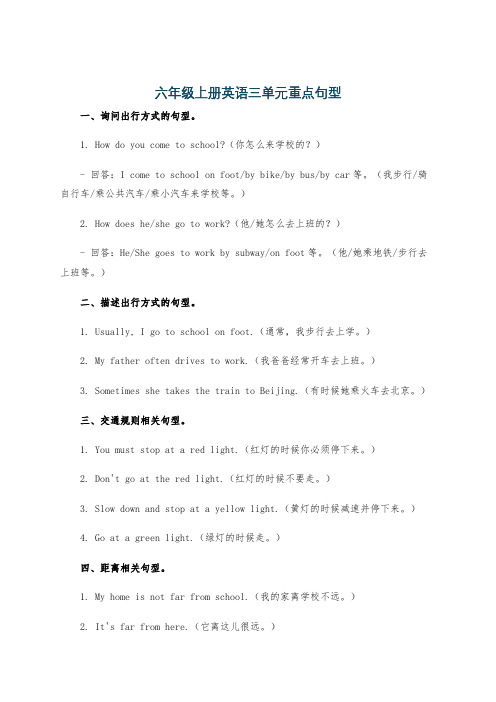
六年级上册英语三单元重点句型一、询问出行方式的句型。
1. How do you come to school?(你怎么来学校的?)- 回答:I come to school on foot/by bike/by bus/by car等。
(我步行/骑自行车/乘公共汽车/乘小汽车来学校等。
)2. How does he/she go to work?(他/她怎么去上班的?)- 回答:He/She goes to work by subway/on foot等。
(他/她乘地铁/步行去上班等。
)二、描述出行方式的句型。
1. Usually, I go to school on foot.(通常,我步行去上学。
)2. My father often drives to work.(我爸爸经常开车去上班。
)3. Sometimes she takes the train to Beijing.(有时候她乘火车去北京。
)三、交通规则相关句型。
1. You must stop at a red light.(红灯的时候你必须停下来。
)2. Don't go at the red light.(红灯的时候不要走。
)3. Slow down and stop at a yellow light.(黄灯的时候减速并停下来。
)4. Go at a green light.(绿灯的时候走。
)四、距离相关句型。
1. My home is not far from school.(我的家离学校不远。
)2. It's far from here.(它离这儿很远。
)- 可以接着说:We can go by bus/We should take a taxi等(我们可以乘公共汽车去/我们应该乘出租车等)。
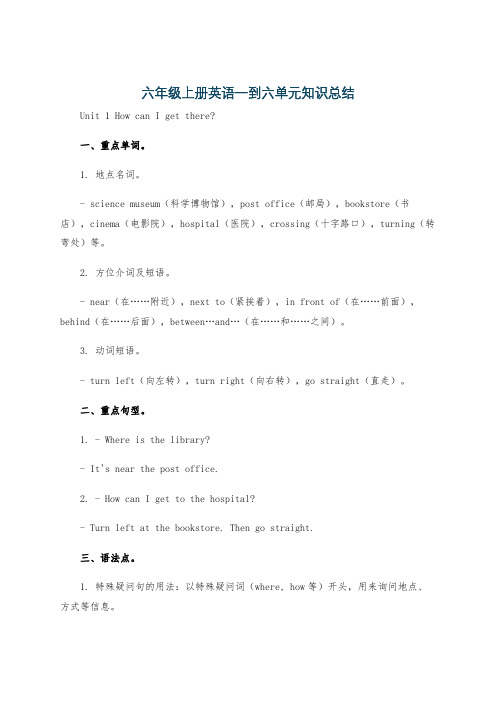
六年级上册英语一到六单元知识总结Unit 1 How can I get there?一、重点单词。
1. 地点名词。
- science museum(科学博物馆),post office(邮局),bookstore(书店),cinema(电影院),hospital(医院),crossing(十字路口),turning(转弯处)等。
2. 方位介词及短语。
- near(在……附近),next to(紧挨着),in front of(在……前面),behind(在……后面),between…and…(在……和……之间)。
3. 动词短语。
- turn left(向左转),turn right(向右转),go straight(直走)。
二、重点句型。
1. - Where is the library?- It's near the post office.2. - How can I get to the hospital?- Turn left at the bookstore. Then go straight.三、语法点。
1. 特殊疑问句的用法:以特殊疑问词(where, how等)开头,用来询问地点、方式等信息。
2. 一般现在时在问路指路中的运用。
Unit 2 Ways to go to school.一、重点单词。
1. 交通工具名词。
- by bike(骑自行车),by bus(乘公共汽车),by train(乘火车),by plane(乘飞机),on foot(步行),ship(轮船),subway(地铁)等。
2. 形容词。
- slow(慢的),fast(快的)。
3. 其他。
- traffic(交通),traffic lights(交通灯),stop(停),wait(等)。
二、重点句型。
1. - How do you come to school?- Usually, I come on foot.2. - How can I get to the Fuxing Hospital?- Take the No. 57 bus over there.三、语法点。

六年级英语重点句型三至六年级常用交际语、重点句型及语法一、常用交际语:1.自我介绍:Hello, I’m Chen Jie. 你好,我是陈洁。
Hi, I’m Sarah. 你好,我是Sarah。
2.问答姓名:What’s your name? 你叫什么名字?My name’s Amy. 我叫Amy。
3.介绍他人:This is John. 这是John。
4.问候语:(1) Good morning/afternoon/evening. 早上好/下午好/ 晚上好。
Good morning/afternoon/evening. 早上好/下午好/ 晚上好。
(2) How are you? 你好吗?I’m fine, thank you. 我很好,谢谢。
(3)Nice to meet you 很高兴认识你。
Nice to meet you, too. 我也很高兴认识你。
5.道谢:Thank you./ Thanks.谢谢!You’re welcome. 不客气!6.告别:Goodbye. 再见。
Bye. 再见。
二、重点句型:1、“我有…”“ Ihave …”例:I have a ruler. 我有一把尺子。
2、“看…““ Lookat…”例: Look at that monkey. 看那只猴子。
3、“让我们一起去…”“Let’s …”例: Let’s go to school. 让我们一起去上学。
4、“涂…成…颜色”“Colour…”例:Colour it red. 涂它成红色。
5、“吃/喝点…吧。
”“Have some …”例:Have some bread. 吃点面包吧。
Have some water. 喝点水吧。
6、“这是…”(近指)“This is…”例:This is Tom. 这是汤姆。
7、“那是…” (远指) “That is …”例:That is my mother. 那是我的妈妈。

Unit1What season is it? It’s spring. 现在是什么季节?现在是春季。
Its weather is warm and rainy. (它的)天气温暖多雨。
What about the weather in the south? 南方的天气怎么样呢?in the south 在南方Unit2Is she your mum’s favourite singer? 她是你妈妈最喜欢的歌手吗?'s名词所有格例the boy's teacher 男孩的老师Zhou Lin's book 周林的书She is my mum’s favourite actress. 她是我妈妈最喜欢的女演员。
Mum and I will go to see that film on Mother’s Day.我和妈妈将会在母亲节那天去看那部电影。
Will将会,具体某天是用onUnit3Who was he/she? 他/她是谁?was是过去式am is的过去式She was a great scientist. 她是一个伟大的科学家。
great 伟大的scientist 科学家He saved many people’s lives. 他救了很多人的生命(他救死扶伤)saved 过去式,lives是life的复数。
Unit4We went on a science field trip last week. 上周我们进行了一次科学考察。
go on进行go的过去式是went,science field trip 科学考察last week 上周What did you learn? 你学到了什么?did是do的过去式。
We learned that ants are good.我们认识到蚂蚁是好的(有益的)learn学习认识到good 好的Unit5When did the Spring Festival start? 春节什么时候开始的?start开始启动It started very long ago. 它很久以前就开始了long ago很久以前是判断用过去式的标志People made moon cakes to celebrate the autumn.人们制作月饼来庆祝秋天made是make的过去式moon cake 月饼autumn 秋天Unit6I danced on Children’s Day last year. 去年我在儿童节跳舞了。
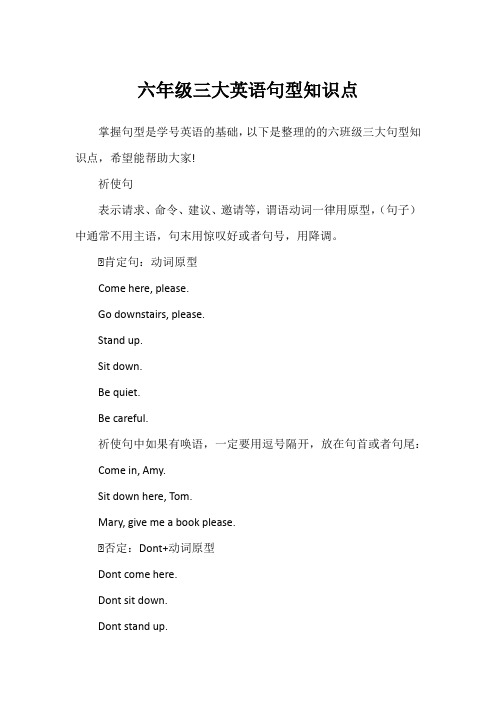
六年级三大英语句型知识点掌握句型是学号英语的基础,以下是整理的的六班级三大句型知识点,希望能帮助大家!祈使句表示请求、命令、建议、邀请等,谓语动词一律用原型,(句子)中通常不用主语,句末用惊叹好或者句号,用降调。
★肯定句:动词原型Come here, please.Go downstairs, please.Stand up.Sit down.Be quiet.Be careful.祈使句中如果有唤语,一定要用逗号隔开,放在句首或者句尾:Come in, Amy.Sit down here, Tom.Mary, give me a book please.★否定:Dont+动词原型Dont come here.Dont sit down.Dont stand up.Dont give me it.let sb. do 让某人做Let me pass.Let us have a rest.Lets have a rest.反意疑问:Lets have a walk along the river, shall we? Let us go out for a drink, will you?倒装句:so/neither的倒装eg: He can swim. So can I.She didnt go to class. Neither did I.结构:so/neither+be+ 主语so/neither+助动词+ 主语so/neither+情态动词+ 主语助动词:一般现在时: do, does/am, is, are现在进行时: am, is, are一般过去时: did现在完成时: have, has一般将来时: will, shall过去进行时: was, were过去完成时: had过去将来时: would感叹句:1) What +名词+主语+谓语What a beautiful girl she is!What tall buildings they are!2) How +形容词+主语+谓语How beautiful the girl is!How tall the buildings are!? 在口语中,感叹句的主语和谓语经常省略:What a nice present!(省略it is)How disappointed!(省略she is或(其它)可作本句主、谓的词语) 六班级三大句型知识点。
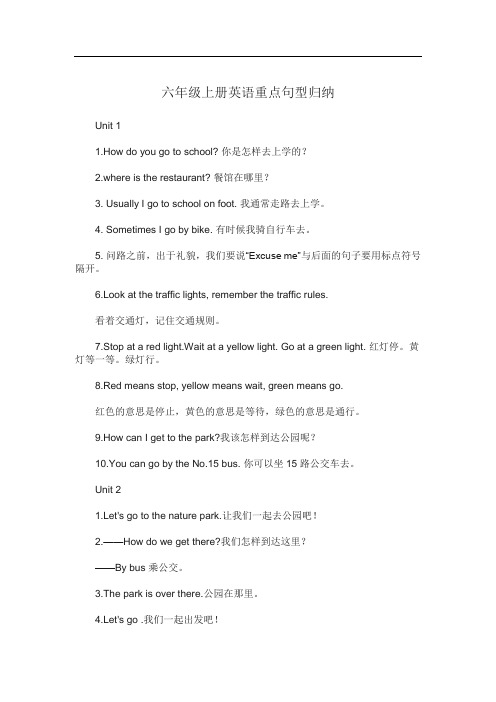
六年级上册英语重点句型归纳Unit 11.How do you go to school? 你是怎样去上学的?2.where is the restaurant? 餐馆在哪里?3. Usually I go to school on foot. 我通常走路去上学。
4. Sometimes I go by bike. 有时候我骑自行车去。
5. 问路之前,出于礼貌,我们要说“Excuse me”与后面的句子要用标点符号隔开。
6.Look at the traffic lights, remember the traffic rules.看着交通灯,记住交通规则。
7.Stop at a red light.Wait at a yellow light. Go at a green light. 红灯停。
黄灯等一等。
绿灯行。
8.Red means stop, yellow means wait, green means go.红色的意思是停止,黄色的意思是等待,绿色的意思是通行。
9.How can I get to the park?我该怎样到达公园呢?10.You can go by the No.15 bus. 你可以坐15 路公交车去。
Unit 21.Let's go to the nature park.让我们一起去公园吧!2.——How do we get there?我们怎样到达这里?——By bus 乘公交。
3.The park is over there.公园在那里。
4.Let's go .我们一起出发吧!5.Slow down and stop at a yellow light.黄灯等一等。
6.Stop and wait at a red light.红灯停。
Go at a green light.绿灯行。
Unit 31.---What are you going to do tomorrow?---I'm going to have an art lesson.此句是个一般将来时态的特殊疑问句。
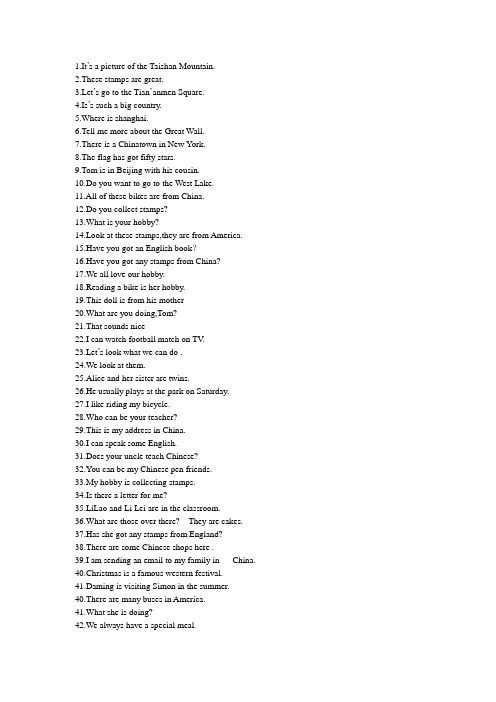
1.It’s a picture of the Taishan Mountain.2.These stamps are great.3.Let’s go to the Tian’anmen Square.4.Is’s such a big country.5.Where is shanghai.6.Tell me more about the Great Wall.7.There is a Chinatown in New Y ork.8.The flag has got fifty stars.9.Tom is in Beijing with his cousin.10.Do you want to go to the West Lake.11.All of these bikes are from China.12.Do you collect stamps?13.What is your hobby?14.Look at these stamps,they are from America.15.Have you got an English book?16.Have you got any stamps from China?17.We all love our hobby.18.Reading a bike is her hobby.19.This doll is from his mother20.What are you doing,Tom?21.That sounds nice22.I can watch football match on TV.23.Let’s look what we can do .24.We look at them.25.Alice and her sister are twins.26.He usually plays at the park on Saturday.27.I like riding my bicycle.28.Who can be your teacher?29.This is my address in China.30.I can speak some English.31.Does your uncle teach Chinese?32.Y ou can be my Chinese pen friends.33.My hobby is collecting stamps.34.Is there a letter for me?35.LiLao and Li Lei are in the classroom.36.What are those over there? They are cakes.37.Has she got any stamps from England?38.There are some Chinese shops here .39.I am sending an email to my family in China.40.Christmas is a famous western festival.41.Daming is visiting Simon in the summer.40.There are many buses in America.41.What she is doing?42.We always have a special meal.43.Please be my pen friend!44.I can write to my pen friend.45.Does he like playing computer games?46.Sam has got a cat and she often plays with it.47.I live in New Y ork but I am not American.48.I’ve got a postcard and it’s from my pen friend.49.She’s got a letter in French but she can’t read it.50.I want to go swimming but I’ve got a cold.51.Have you got a letter in knife and fork or chopsticks?52.I have ten knives.53.I want to visit China someday.54.Here is a letter from Lucy to her friend in the USA.55.Do you like milk ? Y es, I do .56.It says snakes can’t hear the music.57.Look at the pandas . They love bamboo.58.The dog plays with children.59.Lingling doesn’t like football.60.Lucy is cleaning her room now.61.Do you like read books?62.Sometimes Lucy helps her mother.63.I am going to buy a book.64.There are many pet shops in that big city.65.Does Xiaoqiang like drawing a picture?66.Do you often help your mother? Not really.67.She sometimes visits her gaandfather.68.What a big building.69.They want to bring peace to the world.70.There are 191 flags in the UN.71.What a fantastic present!72.There are lots of factories.73.Have you got a computer?74.Is your mother at home?75.How do you go to school? I go to school on foot.76.What are you going to do tonight? I will do my homework.77.Is there a bookstore near your school. Y es, there is.78.What’s your favourite festival? My favourite festival is Christmas.79.Do you want to go to Guilin? Y es, we do.80.What does your mother do?/What’s your mother. She is a doctor.81.Do you like swimming? Y es, I do.82.Mike is going to buy a dictionary this evening.83.Amy is going to visit her uncle tomorrow.84.There is a theatre in the picture.85.Where is the Summer Place? It’s next to the bookstore.86.When are you going to Beijing?87.Jim is studying English . His teacher is talking to him in English.88.We say“thank-you” to our food.89.I can play the violin.90.The snake thinks the flute is another snake.91.Don’t walk on the grass.92.Where are you going ? To the station.93.Do you want to go shopping?94.Is there a library near here?95.Excuse me ,where is the bank ,please?96.Please tell me more about Pandas。
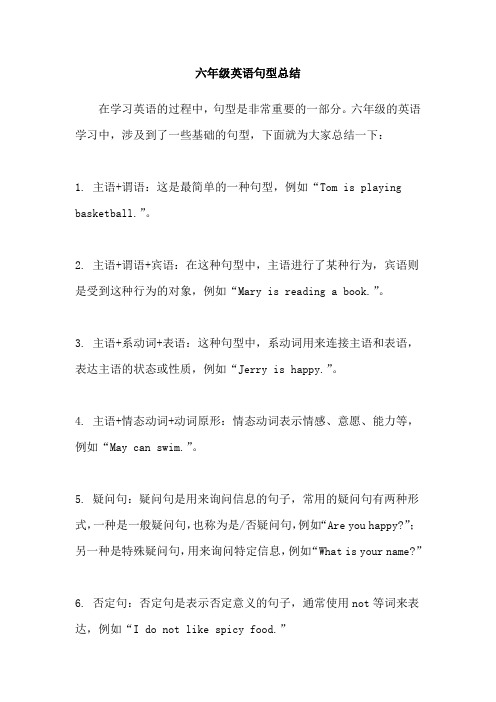
六年级英语句型总结
在学习英语的过程中,句型是非常重要的一部分。
六年级的英语学习中,涉及到了一些基础的句型,下面就为大家总结一下:
1. 主语+谓语:这是最简单的一种句型,例如“Tom is playing basketball.”。
2. 主语+谓语+宾语:在这种句型中,主语进行了某种行为,宾语则是受到这种行为的对象,例如“Mary is reading a book.”。
3. 主语+系动词+表语:这种句型中,系动词用来连接主语和表语,表达主语的状态或性质,例如“Jerry is happy.”。
4. 主语+情态动词+动词原形:情态动词表示情感、意愿、能力等,例如“May can swim.”。
5. 疑问句:疑问句是用来询问信息的句子,常用的疑问句有两种形式,一种是一般疑问句,也称为是/否疑问句,例如“Are you happy?”;另一种是特殊疑问句,用来询问特定信息,例如“What is your name?”
6. 否定句:否定句是表示否定意义的句子,通常使用not等词来表达,例如“I do not like spicy food.”
总之,以上这些句型是六年级英语学习中应该掌握的基本句型,希望大家在学习中能够认真理解和掌握,提高英语口语和写作能力。
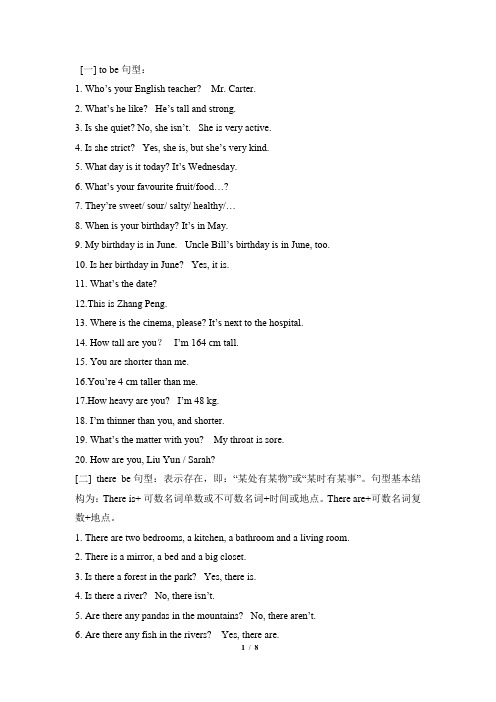
[一] to be句型:1. Who’s your English teacher?Mr. Carter.2. What’s he like?He’s tall and strong.3. Is she quiet? No, she isn’t.She is very active.4. Is she strict? Yes, she is, but she’s very kind.5. What day is it today? It’s Wednesday.6. Wha t’s your favourite fruit/food…?7. They’re sweet/ sour/ salty/ healthy/…8. When is your birthday? It’s in May.9. My birthday is in June. Uncle Bill’s birthday is in June, too.10. Is her birthday in June? Yes, it is.11. What’s the date?12.This is Zhang Peng.13. Where is the cinema, please? It’s next to the hospital.14. How tall are you?I’m 164 cm tall.15. You are shorter than me.16.You’re 4 cm taller than me.17.How heavy are you? I’m 48 kg.18. I’m thinner than you, and shorter.19. What’s the matter with you?My throat is sore.20. How are you, Liu Yun / Sarah?[二] there be句型:表示存在,即:“某处有某物”或“某时有某事”。
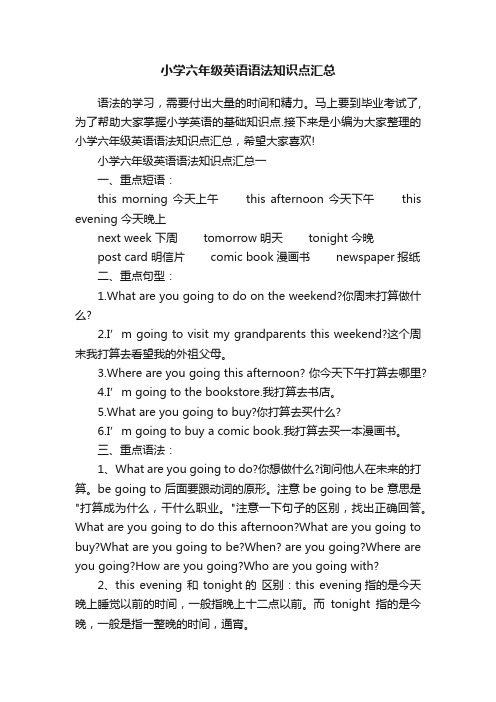
小学六年级英语语法知识点汇总语法的学习,需要付出大量的时间和精力。
马上要到毕业考试了,为了帮助大家掌握小学英语的基础知识点.接下来是小编为大家整理的小学六年级英语语法知识点汇总,希望大家喜欢!小学六年级英语语法知识点汇总一一、重点短语:this morning 今天上午this afternoon 今天下午this evening 今天晚上next week 下周tomorrow 明天 tonight 今晚post card 明信片 comic book漫画书newspaper报纸二、重点句型:1.What are you going to do on the weekend?你周末打算做什么?2.I’m going to visit my grandparents this weekend?这个周末我打算去看望我的外祖父母。
3.Where are you going this afternoon? 你今天下午打算去哪里?4.I’m going to the bookstore.我打算去书店。
5.What are you going to buy?你打算去买什么?6.I’m going to buy a comic book.我打算去买一本漫画书。
三、重点语法:1、What are you going to do?你想做什么?询问他人在未来的打算。
be going to 后面要跟动词的原形。
注意be going to be 意思是"打算成为什么,干什么职业。
"注意一下句子的区别,找出正确回答。
What are you going to do this afternoon?What are you going to buy?What are you going to be?When? are you going?Where are you going?How are you going?Who are you going with?2、this evening 和tonight的区别:this evening指的是今天晚上睡觉以前的时间,一般指晚上十二点以前。

六年级上册英语书第四单元重点句型一、单词短语(基础)1. hobby (复数hobbies)- 含义:爱好。
例如:My hobby is reading books.(我的爱好是读书。
)2. dancing.- 含义:跳舞。
是dance的动名词形式。
例如:She likes dancing.(她喜欢跳舞。
)3. singing.- 含义:唱歌。
是sing的动名词形式。
例如:His hobby is singing.(他的爱好是唱歌。
)4. reading stories.- 含义:读故事。
例如:I like reading stories very much.(我非常喜欢读故事。
)5. playing football.- 含义:踢足球。
例如:They like playing football after school.(他们放学后喜欢踢足球。
)6. listening to music.- 含义:听音乐。
例如:She often listens to music in the evening.(她经常在晚上听音乐。
)二、重点句型。
1. 询问某人的爱好。
- What are your hobbies?(你的爱好是什么?)- 回答:I like + 动名词(短语). 例如:I like reading books.(我喜欢读书。
)- 也可以用My hobbies are + 动名词(短语). 例如:My hobbies are singing and dancing.(我的爱好是唱歌和跳舞。
)2. 表达某人喜欢做某事。
- like/likes+动名词(短语)- 例如:He likes playing football.(他喜欢踢足球。
)- She likes listening to music.(她喜欢听音乐。
)3. 询问他人是否喜欢做某事。
- Do you like + 动名词(短语)?- 例如:Do you like reading stories?(你喜欢读故事吗?)- 回答:Yes, I do. / No, I don't.- 对于第三人称单数(he/she/it等)则用Does he/she/it like+动名词(短语)?- 例如:Does she like dancing?(她喜欢跳舞吗?)- 回答:Yes, she does. / No, she doesn't.。
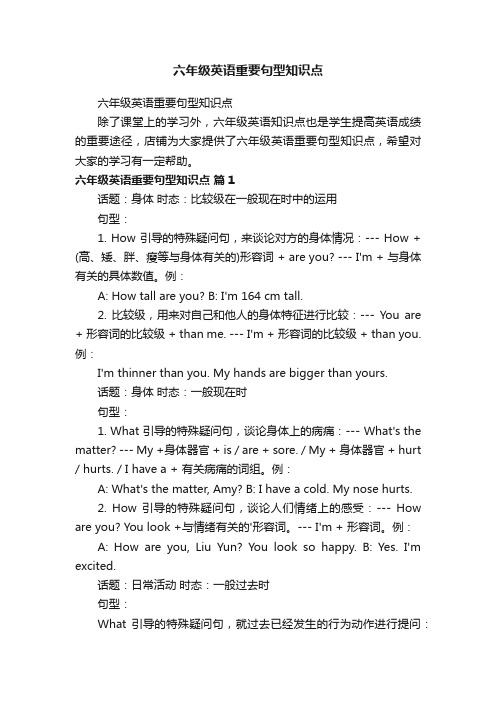
六年级英语重要句型知识点六年级英语重要句型知识点除了课堂上的学习外,六年级英语知识点也是学生提高英语成绩的重要途径,店铺为大家提供了六年级英语重要句型知识点,希望对大家的学习有一定帮助。
六年级英语重要句型知识点篇1话题:身体时态:比较级在一般现在时中的运用句型:1. How 引导的特殊疑问句,来谈论对方的身体情况:--- How + (高、矮、胖、瘦等与身体有关的)形容词 + are you? --- I'm + 与身体有关的具体数值。
例:A: How tall are you? B: I'm 164 cm tall.2. 比较级,用来对自己和他人的身体特征进行比较:--- You are + 形容词的比较级 + than me. --- I'm + 形容词的比较级 + than you. 例:I'm thinner than you. My hands are bigger than yours.话题:身体时态:一般现在时句型:1. What 引导的特殊疑问句,谈论身体上的病痛:--- What's the matter? --- My +身体器官 + is / are + sore. / My + 身体器官 + hurt / hurts. / I have a + 有关病痛的词组。
例:A: What's the matter, Amy? B: I have a cold. My nose hurts.2. How 引导的特殊疑问句,谈论人们情绪上的感受:--- How are you? You look +与情绪有关的'形容词。
--- I'm + 形容词。
例:A: How are you, Liu Yun? You look so happy. B: Yes. I'm excited.话题:日常活动时态:一般过去时句型:What 引导的特殊疑问句,就过去已经发生的行为动作进行提问:--- What did you do + 时间?--- I + 动作(did). 例:A: What did you do last weekend?B: I Played football.Did 引导的一般疑问句,就过去是否发生了某行为动作进行问答:--- Did you + 动词原形?--- Yes, I did. No, I didn't. 例:A: Did you read books? B: Yes, I did.话题:节日时态:一般过去时句型:综合运用Where, When, What, How等词,引导特殊疑问句,就过去已经发生的行为动作进行提问:基本句型同上。

六年级英语知识要点及重点句型第一课短语:look at 看、in the middle 在中间、talk with 谈论、讨论、in the world 在世界上、in front of 在….前面、go out 去外面、look for 寻找、climb up 爬上、get down 下来、go on 继续语法:形容词和副词的比较级和最高级的用法和变化规则用法技巧:当句子里出现单词than(比什么更……)用比较级,(二者比较)当句子里出现单词in ,of 时用最高级(大于等于3者)。
变化规则:a.一般情况下,比较级在词尾加er ,最高级在词尾加est.。
b. 以字母e 结尾的,比较级加r,最高级加st。
c.以福音字母加y 的,把y 变为i ,再加er 和est (如easy,busy,early)。
d.有的需要双写最后一个字母,然后加er 和est。
(如sad ,hot, fat,big,thin)e.不规则good/well ---better---best第二课短语:walk along 沿着、get on 上车、go back 回去、come up 爬上、laugh at 嘲笑、reading room 阅览室句型:——What class is she in ?(她在几年级几班那?------She is in Class 3Grade6(她在六年级三班)-------Where is reading room?(阅览室在那?)-------. It is on the second floor.(它在第二层楼上)语法:基数词和序数词的转换:one –first 、two-second、three-third、five-fifth、eight-eighth 、nine-ninth 、eleven-eleventh、twelve- twelfth (一般情况下,直接在基数词尾后加th,就变成相对应的序数词了。